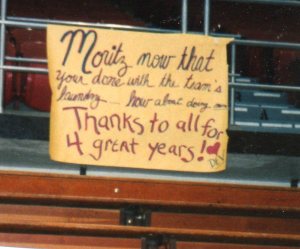It was a particularly lackluster practice and in typical fashion our basketball coach threw a bit of a fit. He went on a verbal rampage trying desperately to explain to this group of high school girls the possibilities that existed for them in sport.
He went on about a former player who not only was getting her college paid for through a basketball scholarship but received several free pairs of shoes and free practice gear.
The excitement over the potential for a scholarship, for two pairs of sneakers and some shorts and t-shirts, seems a bit quaint in the current world of athletics where high school players of both sexes have come to expect certain things as inalienable rights — life, liberty and an endless supply of Nike accessories. But when thinking about today’s anniversary of Title IX, I thought back to that high school basketball practice and what it meant for the girls in that gym.
 For the record, I was the team manager and statistician, but Title IX opened doors for me, too. It allowed me to become a manager in college, which, by my junior, brought me a partial scholarship (thanks to the coaching staff making a Title IX stink so that the managers of the men’s and women’s teams were treated equally). My position with the women’s basketball team allowed me to travel, including such adventures as taking my first airplane trip and wandering around Philadelphia looking for a laundromat to wash the team’s uniforms.
For the record, I was the team manager and statistician, but Title IX opened doors for me, too. It allowed me to become a manager in college, which, by my junior, brought me a partial scholarship (thanks to the coaching staff making a Title IX stink so that the managers of the men’s and women’s teams were treated equally). My position with the women’s basketball team allowed me to travel, including such adventures as taking my first airplane trip and wandering around Philadelphia looking for a laundromat to wash the team’s uniforms.
Title IX did not allow me to become an athlete. That’s a definition and an identity that emerged for me later in life and Title IX had no direct impact on my ability and access to bike shops, fitness centers, running events and triathlons.
But Title IX did have an indirect impact. As the cliche goes, it helped to change the landscape of sports for women. And while there are miles to go before we sleep in equitable athletic peace, today I choose to celebrate Title IX.
No doubt many will want to talk about how Title IX has hurt men’s collegiate programs, the “problem” of football or debate the quantity and quality of women’s sports coverage in the media. At various times, I’ve tackled most of these subjects, all worthy of attention and civil (emphasis on civil) conversation. The difficulty with those discussions is that it often leads into defending women’s sports and female athletes.
And today, I don’t want to justify who I am, where I’ve been or where I want to go.
Today, I just want to be.
I want to be a female athlete and embrace all that has to offer. I want to recall how much I loved watching Mia Hamm and Julie Foudy in the 1999 Women’s World Cup. I want to remember catching Cheryl Miller lead USC to national titles in the mid-1980s when CBS played the women’s basketball championship game in the middle of the afternoon. Title IX gave those women opportunities to play and in turn, they inspired me. They gave me an inkling that maybe, I too, could be an athlete, even if at the time the desires were still to be articulated.
For the record, this doesn’t exclude men. My formative years were spent watching the Buffalo Bills, Buffalo Sabres and men’s college basketball with pride and passion. There are plenty of men in my life who have encouraged and supported my own clumsy journey toward finding my athletic identity, even if they don’t realize the extent to which they’ve helped. Trust me, just being welcoming can lighten the load of uncertainty and fear.
This weekend I will be participating in the Welland Triathlon. Some other friends will be competing in the Quakerman Triathlon and I have still other friends out of the area who will be racing or training. Some of us benefitted directly from Title IX, being part of school teams in high school or college. Some of us were only on the periphery, but through time found our way to an athletic lifestyle that included multitudes of women just like us — women who find strength and courage and freedom and friendship in sports.
The opportunity for some — to play elite athletics and earn college scholarships — had an affect on many.
And for that, we should celebrate.

Title IX was a great law. Too bad it was turned against itself in a fit of retribution. Sports are just the start, it’s real crime is in the hurdles it set up for minority boys in education. For some reason, a Canadian girl has more right to athletics and academics in American than a poor African American boy because Title IX assumes we have treated the foreign national girls worse than African American boys throughout our history.
Before discrimination was ignored, now it’s required. Before it was borne from ignorance, now its borne from retribution.
You may just want to ‘be’ but millions of boys, especially the minority boys, don’t have that option.
Just catching up on my reading…this was a great post!
You might be interested in a slightly different take on Title IX posted at
http://invincibleprobity.wordpress.com/2011/03/28/why-are-american-men-so-dumb/
“Why Are American Men So Dumb?”